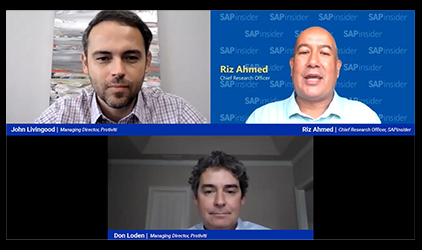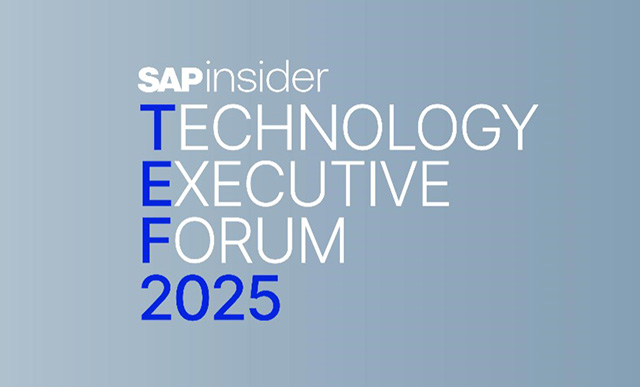Set Yourself Apart with Cross-Industry Insight
by Brianna Shipley, Senior Editor, SAPinsider
The concept of “industries” classifies companies by their primary business activities, such as making cars, providing healthcare, or producing food. That’s how they make money and win (or lose) market share, and that’s where innovation and investment are allocated during difficult times.
Competitive pressure, advancements in technology, and the pursuit of new business opportunities can compel companies to move into adjacent industries. For example, a global food manufacturer in the agribusiness industry may develop assets such as an energy provider and wholesale distribution. These assets complement or become part of the core business model as it evolves to cover more of the farm-to-fork value chain. To achieve a competitive advantage, companies need to look beyond creating new processes within their organization that set them apart from other businesses. Instead, they need to find ways to take advantage of shared knowledge across industries at the process level so they can reallocate time and brain power to reshaping and reimagining core investments.
Explore related questions
To understand the impact of leveraging cross-industry knowledge, consider Tesla, says Shane Paladin, President of Services at SAP SE. “Daimler actually created an electric car before it ever made a combustion engine, but Elon Musk was able to bring Tesla to market first because he assembled all of the complementary assets needed to bring it to market, such as providing and operating the charging infrastructure for Tesla vehicles.”
This, Paladin says, is process innovation — taking the best parts of different industries to deliver something novel. And, he continues, SAP is in a strategic position to partner with customers to help them create next-generation business models that allow them the flexibility to assemble the best parts of every industry with access to content across all industries. This content is made available through SAP’s industry cloud — a portfolio of cloud solutions from SAP and SAP partners, built on SAP Cloud Platform, that integrate with SAP landscapes to address cross-industry needs out of the box.

Shane Paladin, President of Services at SAP SE
“SAP offers so many standardized industry solutions that companies can adopt to free up mind space and budget and reduce complexity,” says Paladin. “Customers are starting to realize that they’ve spent too much time trying to re-create systems and processes that are not unique to their business when they could have saved a good deal of time and reallocated a lot of imagination by adopting out-of-the-box, industry standard solutions built by SAP and focused their efforts on the truly differentiated piece of their business.”
Peter Maier, President of Industries and Customer Advisory at SAP SE, adds to this perspective: “SAP’s industry cloud also enables customers to build bespoke solutions that are specific for their business and give them the competitive edge they are seeking in this digital age.”
Move Fast and Focus on What Matters
When business is going well for an organization, its breadth of activities tends to mushroom. When a crisis or disruption hits — such as a natural disaster, a technology breakthrough, or a pandemic — successful companies focus on streamlining systems and processes to address what is fundamental to the business. Maier emphasizes how important it is to identify and protect what makes a business unique and profitable. In times of disruptive change, this may require investing in optimizing and transforming the core business processes. Take the energy utilities sector, for example. Successful companies will go beyond just supplying electricity or gas to businesses and consumers and will begin to think and act like data companies. They will unlock the business value in vast amounts of data, such as optimizing business processes, delivering better customer service, and developing new business models.
The global events of 2020 have shifted market needs and consumer behavior by driving increased demand for online ordering options and accelerating new ways to learn about customers or to diagnose/treat patients. This has pushed organizations to re-evaluate what they considered fundamental to their business and their supporting processes. Companies that were well-equipped to pivot quickly before the crisis (which, in many cases, were those using intelligent technologies) are successfully adapting by providing products and services that cross industry lines.
For example, an SAP customer and business-to-business food delivery service company in the UK recently opened an e-commerce channel in just a few days using the best practices processes they found in their SAP systems and in the cloud. The company’s experience is representative of the challenge and opportunity that consumer products companies are faced with to supplant retailers with their own online and delivery channels. This opportunity allows businesses to scale consumer access, get closer to the market, and siphon retailers’ profits into their own pockets.
“Winning companies are using solutions available in SAP’s industry cloud to assemble the best of every industry so they can innovate faster,” says Paladin. Having data and intelligent technologies built into business processes is key to achieving this speed, he adds, which requires innovation at the data and infrastructure levels. Combining the wealth of enterprise data with data from external sources can create business-changing opportunities. Intelligent digital technologies can find patterns and enable use cases that were beyond reach only a few years ago. Data intensive processes and analytics need rapidly scaling computing power. SAP partners such as Amazon Web Services manage and run scalable computing power, resulting in a strategic advantage for businesses that also allows them to reduce complexity, free up mind space, and unlock business innovation budgets.
By driving process innovation with industry cloud solutions, companies can become more responsive and better prepared to capture new business opportunities, even in the face of disruption. “If businesses have planned for disruption, then it is no longer really a disruption — it becomes an event that creates the opportunity to do something differently or try something new,” says Maier. “The ecosystem of applications sourced from and built in SAP’s industry cloud — the only open yet integrated platform in the world where SAP, partners, and customers can innovate together — helps businesses become more resilient for the future.”
Enabling Businesses to Become Architects of the Future
Seeking out opportunities and knowledge across industries and applying them at the process level looks different for each industry at the ground level. For example, many businesses in the life sciences industry are putting their stock into state-of-the-art supply chain and automation solutions to produce medical products and devices faster, while some businesses in the automotive industry are changing the products they create altogether, shifting from making and selling cars to providing new mobility solutions.
In all cases, industry cloud solutions help companies solve a universal need to increase agility, optimize business processes, decrease and prepare for disruption, and improve sustainability, creativity, and resilience. “The lines between industries are blurring,” says Paladin, “and SAP is helping companies become architects of their future by providing a platform that supports and even inspires process innovation.”
Process innovation can help companies address important issues outside of their own business as well, such as climate change and sustainability, which are essential initiatives for SAP and part of the recommended strategy for becoming an intelligent enterprise.
“In every part of the world right now, we’re seeing the environment talking back, and it’s apparent that change is happening, resulting in economic, societal, and frankly, health impacts,” says Maier. “People are understanding that we have stewardship of the planet and it’s our job to be more responsible in how we treat the world we live in and in which condition we leave it to our children and grandchildren.”

Peter Maier, President of Industries and Customer Advisory at SAP SE
One way that companies are helping to treat the planet better is by selling products that are ethically sourced and sustainable over time. “Customers will pay a premium for those products,” says Paladin. Solutions within SAP’s industry cloud can help companies remain true to their promise of creating products that are sustainable in nature by providing systems and insight that can help them identify a breakdown in the governance of their process — for example, detect an event that would put a company’s integrity at risk. In this scenario, SAP could help them assemble a new supply chain and accelerate that supply chain to market faster.
“It’s in everyone’s best interest to act in ways that can protect the planet, and consumers can play a role by buying things that are ethically sourced. SAP is in a position to help companies meet this market need and provide products that are sustainable in nature and ensure the security of their systems and processes toward that aim,” says Paladin.
Accessing Innovation
SAP’s industry cloud is creating momentum and enabling resilience and transparency around business operations with solutions for a broad range of industries. Companies and partners such as PWC, Tomlinson Group, E.ON, and Delivering Good have started to adopt these new industry cloud solutions and are already experiencing benefits that support their business objectives.
Ready to take the next step? Begin your journey with SAP’s industry cloud, and learn how SAP Services can help you on your digital journey.








